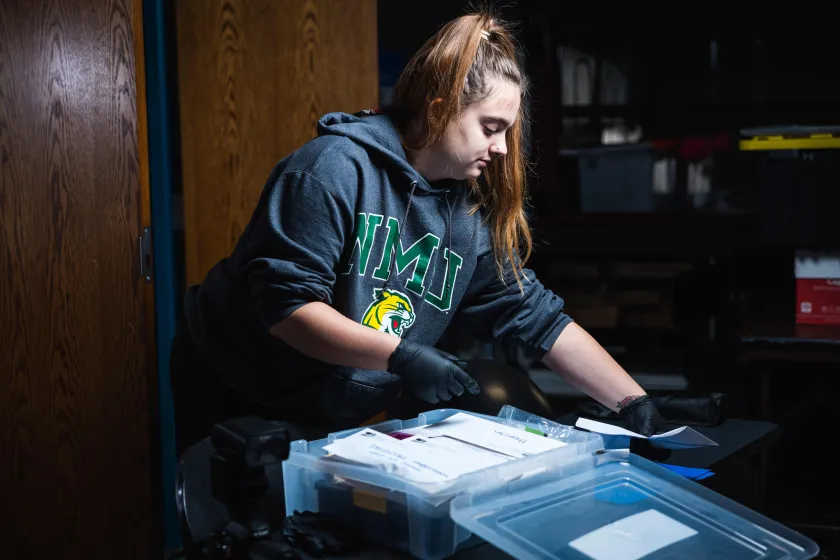Northern Michigan University's Criminal Justice Department will double the number of students working directly with the Michigan State Police (MSP) to analyze U.P. homicide or missing persons cold cases in the hope of generating new leads. The recently approved state budget includes a $200,000 funding boost for the collaboration, which launched in fall 2022.
NMU's cold case seminar was previously limited to eight students from various academic disciplines. There will now be two sections offered each semester to tackle two separate cases, with more dedicated space to accommodate the growth.
Two NMU alumni are leading the effort. Instructor Christopher MacMaster retired after 25 years with the MSP as a trooper, investigator and polygraph examiner. Detective-First Lt. Paul Campbell works in the special investigation section of MSP's Eighth District Headquarters in Marquette.
“It's a win-win on multiple levels,” MacMaster said. “The experiential learning our students receive by working with MSP detectives to give a real cold case a fresh look enhances their career preparation and sets them apart, making them more competitive in the job market. The MSP and victims' families benefit from the actionable leads students have developed to move the investigations forward; some are awaiting forensic analysis and followup. This program is also a great way for the MSP or other agencies to recruit new employees.”
Impending NMU alumnus and MSP Trooper Evan Durbin was a cadet at the Negaunee post for two years, and returned for a full-time job in early June after completing recruit school in Lansing. He was among the Northern students enrolled in the seminar.
“It was a great class, especially leading into a career,” Durbin said. “It's not every day you get presentations from detectives or guest speakers working on actual cases, or have a chance to review legitimate case files. I liked how Chris broke it down and had us work with partners, which helped with organizational skills. Going through a case file with 50 supps [supplemental reports] to weed out information that wasn't necessarily relevant brought critical thinking into play. And coming up with new tips on an older case that had already been heavily scrutinized required attention to detail.”
Durbin's partner in the seminar, Chloe Valente, agreed that students leave the cold case experience with a unique set of skills and perspectives that will prepare them for a successful career in a variety of fields. She graduated with a criminal justice degree and business administration minor, and is currently a marketing and communications intern with Lear Corporation in Southfield.
“While I didn't quite choose the typical criminal justice route, I apply a majority of what I learned in the cold case program to my everyday life,” Valente said. “That includes critical thinking, collaboration, understanding of human behaviors, and always keeping an open mind. During this program when we weren't busy analyzing, we would always be finding ways to improve and deepen our knowledge while interacting and networking with real time professionals in all avenues of criminal justice, forensics, DNA analysis and detective work. It was truly one of the coolest things I've ever done, so it's awesome they got funding to give more students the same opportunity.”
NMU students have to interview for a spot on the cold case seminar's limited roster, undergo a background check, sign a non-disclosure agreement and lock up their cell phones and laptop computers before they enter the associated classroom or lab. They also pore over materials retrieved from a storage room that was re-keyed for restricted access.
“We had to establish a secure computer network on campus and order specialized equipment to comply with Michigan State Police security standards,” said Bob Hanson, head of the NMU Criminal Justice Department. “These and other precautions are necessary because the students are tasked with re-examining and digitizing the entire case file so detectives can review photos, lab reports, interview statements and police reports from multiple agencies on their phones.”
“The chain of custody still needs to be maintained for all documents and certain types of evidence, but we don't keep actual physical evidence on campus,” MacMaster added.
Similar collaborations between law enforcement and higher education are becoming more common, particularly after Western Michigan University's cold case program garnered national media coverage for helping to solve the 1987 murder of Roxanne Wood in her Berrien County home. Rather than “reinvent the wheel,” NMU reached out to WMU for guidance on the initial planning and format for a cold case course before launching its own.
For more information on this and other programs in NMU's Criminal Justice Department, visit nmu.edu/criminaljustice.

